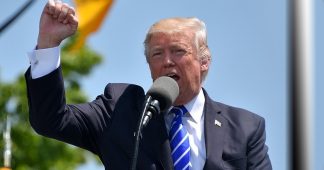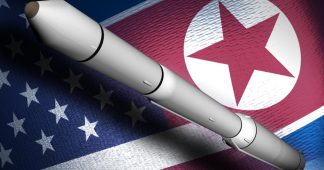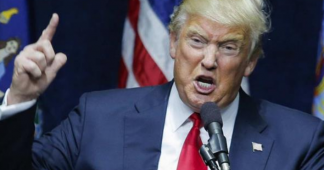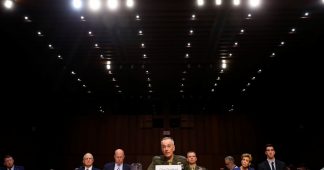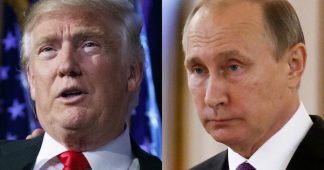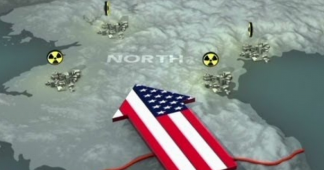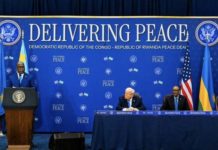The Trump administration is escalating its incendiary threats against North Korea in the wake of the test Tuesday of an intercontinental ballistic missile reportedly capable of reaching the east coast of the United States.
At an emergency meeting of the United Nations Security Council on Wednesday, the US ambassador to the UN, Nikki Haley, warned that “if war comes, make no mistake, the North Korean regime will be utterly destroyed.” The “utter destruction” of the regime can only mean a genocidal war against the country of 25 million people.
Haley directed her fire as much toward China as toward North Korea, reporting that President Trump had called Chinese President Xi to demand that China cut off all oil exports to the impoverished Asian country. “China must show leadership and follow through. China can do this on its own,” she said, “or we can take the oil situation into our own hands.” What precisely was meant by this threat, Haley did not elaborate.
It is clear that the United States is in the advanced stage of planning some form of military operation against North Korea, which, if carried out, would have catastrophic consequences even if it did not develop into an exchange of nuclear weapons.
In a signal that the Trump administration is moving to formally abandon its pretenses of diplomacy, the New York Times reported on Thursday that the White House is planning to push out Secretary of State Rex Tillerson, whom Trump previously publicly rebuked for “wasting his time” by pursuing negotiations with North Korea. Tillerson had said on Tuesday, following the ICBM test, that “diplomatic solutions remain viable and open for now.”
Republican Senator Lindsey Graham, an occasional critic of Trump, solidarized himself with the war threats of the administration, telling CNN Wednesday, “If we have to go to war to stop this, we will. We’re heading toward a war if things don’t change.”
Graham said that Trump “is ready, if necessary, to destroy this regime to protect America, and I hope the regime understands that if President Trump has to pick between destroying the North Korean regime and the American homeland, he’s going to destroy the regime. I hope China understands that also.” New York Times columnist Nicholas Kristof, no doubt channeling information from sources within the military and the state, wrote on Thursday (under the headline “Headed Toward a New Korean War?”), “One lesson from history: When a president and his advisers say they’re considering a war, take them seriously.” Kristof reported that “the international security experts I’ve consulted offer estimates of the risk of war from 15 percent to more than 50 percent. That should be staggering.”
The threats by the United States to obliterate North Korea have been escalating throughout the year. Haley’s comments come just over two months after Trump’s speech before the United Nations, in which he declared that the US was “ready, willing and able” to “totally destroy” North Korea and its 25 million people.
The threats have a logic of their own. Having already declared that the US will take “preemptive” action against North Korea if it develops weapons capable of hitting the continental United States, the administration feels increasingly compelled to carry through on such statements, fearing that any retreat will severely damage the credibility of similar threats by American imperialism in the future.
A war, once launched, also has its own logic, threatening the lives of hundreds of millions throughout Asia and beyond. The demands that China act against North Korea point to the fact that the principal concern of the American ruling class in the region is the growing influence of China. The United States has been systematically building up its military capacity in and around the South China Sea for years, particularly under the Obama administration’s “pivot to Asia.” Leading generals and think tanks have already warned that a direct conflict with China is only a matter of time.
China responded to the first Korean War (1950-53), in which the US leveled most of the infrastructure in the northern portion of the peninsula, with a massive military counterattack. The current Chinese government would no doubt see a move by the US to overthrow the North Korean regime as an existential threat to its own strategic interests.
And how will Russia respond to an attack on North Korea, which borders Russia on the east? The country’s top diplomat Thursday accused the US of pushing North Korea into “rash action,” calling on the US and South Korea to cancel military exercises due to begin this week.
The recklessness and criminality of the Trump administration—and the American ruling class as a whole—are astounding. The mad dash to war is proceeding without any significant discussion by either the American media or the US Congress of its real consequences. The former is consumed by an endless series of allegations of sexual harassment, while the latter is preoccupied with the drive to pass a massive tax cut to corporations and the rich, which has sent the stock markets soaring once again. Undeterred by the war danger, the Dow Jones Industrial Average closed above 24,000 for the first time ever on Thursday, with the financial aristocracy licking its chops at its imminent windfall.
The war threats against North Korea intersect with an unprecedented political crisis in the United States involving ferocious conflicts within the ruling class as it oversees a country riven by social tensions. The Trump administration is responding, on the one hand, with the escalation of threats against North Korea, and, on the other, by intensifying its efforts to mobilize far-right forces, expressed in Trump’s retweets of anti-Muslim videos from the fascistic Britain First movement earlier this week.
Trump’s ruling-class critics have sharp differences with the administration over foreign policy. To the extent that they are expressed, however, criticisms within the political establishment over the latest rounds of threats are focused on their impact on the interests of American imperialism. The Democrats are presently engaged in a neo-McCarthyite campaign over allegations that Russia is “sowing divisions” within the United States—used to justify a regime of Internet censorship and to prepare for military conflict with Russia, the main focus of those sections of the military and intelligence establishment that supported Hillary Clinton in the 2016 election.
In the final analysis, the divisions within the ruling class are of a tactical character. All are united on the basic strategy of using the military power of the United States to maintain its global hegemonic position.
A quarter-century of unending war has reached a critical juncture. The danger of nuclear war, involving the major powers, is real and present. The independent intervention of the working class against imperialist war and the capitalist system that spawns it is the decisive political task.
Joseph Kishore
